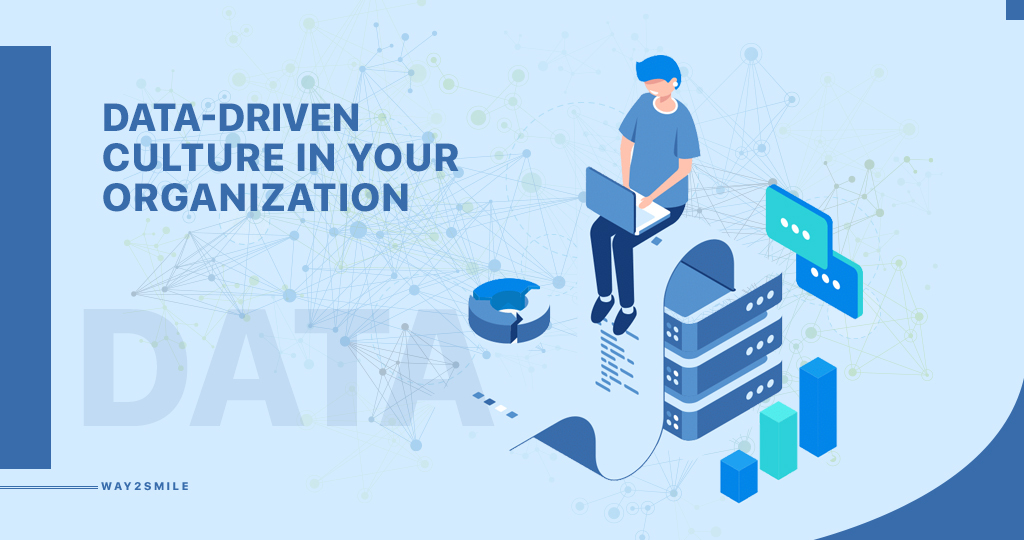
How to create a data-driven culture in your organization?
You open a random article or blog about digital transformation on the net, you will find loyal advocates who want you to adopt a data-driven culture for your company. Yet, there is only a handful company that adopts such a system in their work process. Those handful companies have more chances of being successful in their respective industries than others. This is because of the simple fact that any system that adopts a scientific approach is bound to be more analytical and establish a correlation between events. This helps to draw more conclusions about a particular topic.
Also, incorporating a data-driven culture is not a one-time job. There is also not a particular department where you can take all the data-driven decisions. It is not a technology per se, but there is more to establish a data-driven culture than its looks. A data-driven culture is more of an implosion rather than an explosion. The change must happen at a fundamental level and be spread across various domains.
Subtle Ways

Data-driven culture should happen subtly. The key to the successful implementation of a data-driven culture in an organization is that the idea of adopting a data system should not be seen as a separate entity; rather it should be integrated into the process itself. A data-driven culture is nothing but backing up your decisions and work process with facts rather than intuition or ignorance.
This may sound easier but is a real task while implementing it. The change must take place at an individual level. Only when the change happens at an individual level, a group can comprehend the data-driven culture. It is more of a state you are in. it depends upon your thinking process. Even small things within the organization should be backed by data.
This raises an important question; in an organization where hundreds or thousands of employees work, which data should be considered as the final one?
Credibility

To identify the value of data, it is important to know the credibility of the source. Subject matter experts across various departments are important to form a data-driven culture. The freedom upon which they work needs to be expanded so that a single matter in hand gets various dimensions. The thing about data-driven decision-making is that it completely depends upon the context. People have to understand that any decisions made in business have a probability to fail. All the mechanisms that people adopt in their business have everything to do with minimizing this probability.
Inputs-Data driven culture thrives on it. One can make an informed decision only when there is enough information in hand. The system should allow employees to share inputs without any restrictions. This should not be limited to a single layer of the organization, but the freedom to share input must be there for the whole pyramid. A data-driven strategy for an organization should be built on a solid foundation of mutual knowledge between the employees and the decision-making body. When various information is collected for a particular matter at hand, the decision-making body of the organization is forced to evolve.
The root cause of the problem is partly due to miscommunication. Management fails in distributing the valuable data with the employees. Maintaining transparency is also a significant problem. An employee should be able to map out where he/she stands in the chain and the roles and responsibilities of the employees should be clearly mapped out. Employees should know their contribution to the management and the organization should educate employees about the consequences of their work when omitted in the chain.
Read Also – How Master Data Management helps to manage critical organizational data?
Invest in the science of data

This is an obvious task if you want to establish a data-driven culture in your organization. It is important to understand the needs of your business and weigh them besides the wants. In today’s scenario, the need for investing in data and the technology around this has become second nature to businesses. Almost all businesses are transforming digitally hence the pressure to stay relevant is now more than ever. The competition between companies is narrower in recent days than it used to be. This has pushed the companies to find creative solutions and is forcing them to stay unique.
Investing in data can give you an edge over the competition. Data science uses advanced statistics for an event to occur. This is the most precise method we have in the market now. Data analytics can devise an effective way to comb through mountains of data in mere moments. Data Engineering Solutions can help you identify patterns of data and establish a correlation that can significantly change your game. Investing in data can also make you future-proof since most of the anticipated innovations are focused on data than anything else. This includes business intelligence strategy too.
While incorporating the aspects of data, a business is forced to envision the goals of their organization through the science of data. This will help you in establishing a data-driven culture naturally.
Read Also – What is Predictive Analytics and How does it help an organization’s head to make better decisions?
Transform your vernacular

This doesn’t mean adding loads of pressure on employees by making them stick to certain impractical rules but to clearly express what you expect from them. Imagine if your business or organization has implemented all these above-mentioned steps. You cannot force employees to adapt to the changes. If you do so, the change won’t be organic and will break the workflow. When you want to make a certain decision, take the lead in creating a data-driven culture. Present a layout of your sources and facts and explain to your colleagues the grounds on which you have taken a particular decision. Once you set the tone, your employees would grasp the hint and follow the path to create a data-driven culture.
When you speak in a meeting, proceed with analytical data. Don’t be shy to shed more light on the numbers because ultimately the business depends upon those. Create an atomic model and explain how much business is going to take place for one unit of work. When you change this tone, many terms that were once deemed as jargon would be added to your organization’s vernacular.
Read Also – Why data analytics is essential to your organization’s pandemic recovery?
Concluding…
Data-driven decision-making paves the way to create a data-driven culture. An organization would have a diverse basket of employees. The ability to make data-driven decisions should be an instinct for them. When you pair such a fundamental concept in a diverse group, the number of perspectives you get out of them skyrockets! A data-driven culture is more abstract and requires a transformation among individuals to completely adopt such a system for an organization. The change should sprout from the apex of the hierarchy and spread towards the foundation of the pyramid.
